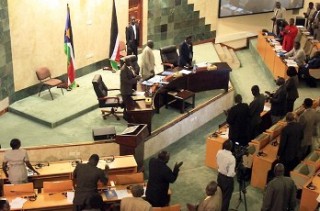S. Sudan lawmakers hint at passing security bill without presidential assent
January 9, 2015 (JUBA) – South Sudanese lawmakers on Friday hinted on the possibility of passing the controversial security bill without the president’s approval, provided it is supported by two-third majority of legislators in the national assembly.

“There are three mechanisms and ways in the constitution for a bill to become a law. One way is that any bill approved by the assembly can become a law if it is approved by the two thirds majority of the members. In this case the assent of the president is not required,” the lawmaker told Sudan Tribune.
He added, “The way is that any bill approved by the assembly shall not become a law unless the president assents to it and signs it into law. If the president withholds the assent for thirty days without giving reasons, the bill will automatically become law. The last provision is when the president assents the bill into law on time”.
The controversial bill was last year sent to the assembly by president Salva Kiir for further revision meant to accommodate some of the sections of the law which reportedly in conflict with some provisions of the country’s Transitional Constitution.
Meanwhile, the government chief whips in the assembly, Tulio Ayahu, echoed Duwar’s argument, citing article 109 (1) (c) which permits passage of any bill by lawmakers.
“The national legislative assembly conducts of business regulation 2011, under the section which talk of subsequent procedure on bills is very clear. Article 109 (1) (a) stipulates that any Bill approved by the Assembly shall not become law unless the President assents to it and signs it into law. If the President withholds assent for thirty days without giving reasons, the bill shall be deemed to have been so signed.
(b) Should the President withhold assent to the Bill and give reasons within the aforementioned thirty days, the Bill shall be re-introduced to the Assembly to consider the observations of the President.
(c) The Bill shall become law if the Assembly again passes it by two-thirds majority of all its members, and the assent of the President shall not be required for that Bill to come into force. These are very clear constitution provisions”, explained the lawmaker.
Ayahu did not elaborate on whether the house would pursue unilateral passage of the bill which critics and human right organisations fear government could apply to subjugate dissent by curbing civil liberties.
(ST)
